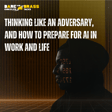Introduction to Love and Sex with Robots Conference
00:00:14
Speaker
All right, this week we got something a little different. It's actually me more or less interviewing George a but really, as you know, probably a conversation.
00:00:26
Speaker
So, George, you went to your annual pilgrimage to Love and Sex with Robots, which is a conference up in Montreal, and we just thought when we were talking that that seems like a pretty good...
00:00:40
Speaker
Follow up to our episode with Savannah Sly. If you haven't heard that one yet, you should definitely check that one out.
The Intersection of Technology and Sexuality
00:00:46
Speaker
So, you know, obvious question first, George. ah Let's give you a space to talk about what you saw or or what your experience was at LSR this year.
00:00:58
Speaker
ah Yeah. So, um I mean, it's always cool to do episodes like this once in a while. Yeah. okay Call it out. um But yeah, so Los Hire is cool. It's a very, very like peak cutting edge academic conference.
00:01:13
Speaker
I found myself there because I just to do a presentation a couple of years ago on pen testing Wi-Fi enabled sex toys, which led into a community relationship with a bunch of Kinsey Institute folks and people who are looking at like the intersection of of technology and sexuality, which for a guy working a dating site, that's kind of relevant.
00:01:33
Speaker
um This year was kind of interesting because now, you know, whereas before they were dealing with a lot of like robotics and dolls that weren't really quote unquote sentient at all.
00:01:46
Speaker
Now there's the whole AI companion factor baked into the robots. So now you're getting like, as close to a simulated human experience as possible out of the artificial.
Evolution of AI Companions
00:01:58
Speaker
Yeah. Kind of like an embodied LLM. So it can naturally respond or i am but i'm not going to say understand, but it is responding to speech in a way that like the stereotypical sex doll can't.
00:02:11
Speaker
Yeah. And so it's, it's fascinating because you have like, again, you have some really interesting people here. So, you know, like,
00:02:22
Speaker
You know, there's a lot of stuff like ah Dr. Nicola Doering, who she is a really big professor. She handles like media psychology and media design in Germany.
00:02:32
Speaker
um And Germany, by way, is very cutting edge for this kind of stuff. um She had a whole talk on on on the human technology connection in terms of like navigating scientific insights and and and kind of public narratives around this whole people getting intimate with my either a robot or an AI companion.
00:02:53
Speaker
which is really like when we're talking about being intimate with technology, that's what we're talking about. um You know, so she had some really cool stuff. And then there was another lady, Laura Karian, who was actually talking about sex robot brothels, which is, believe it or not, a real thing that exists.
00:03:10
Speaker
Oh, man, that feels like ah Blade Runner shit. Yeah. a Dude, that
Societal Acceptance of Sex Robot Brothels
00:03:17
Speaker
it was. And like they interviewed people. like They had like videos of interviews from people in Europe who were actually like running these, we'll call establishments. They're they're nice in their so they're legitimate business. yeah hey And they service a need. And um it's kind of interesting because You know, before you start kind of shitting all over it, which is most people like a lot of cis vanilla minded people's natural disposition is to show all over it.
00:03:44
Speaker
um The one angle that's kind of interesting is that it was a very queer welcoming kind of place. And and you kind of forget the queer aspect to it where. You have folks who don't really fit into the heteronormative binary fold of of typical Western
Impact of AI on Human Intimacy
00:04:03
Speaker
sexuality. And so that creates a place for them to go find their own or whatever their thing is. And, you know, I think if we go back to the basic common standards of progress as a society, if something is not illegal and something is not harming other people,
00:04:23
Speaker
I typically speaking, it might not be my cup of tea personally, but as as a legal thing that we should permit, i think it's kind of in the green, you know?
00:04:34
Speaker
Yeah, I largely agree. i guess my considerations are,
00:04:45
Speaker
is there a place where you rely too heavily on the tech and you sort of like, I can see maybe, in the logic of somebody who's trying to discover a part of themselves and needing a safe space to do that, whether that's a kink or something else, do they ever then relay that into a human experience or does it stay segregated into this highly tech mediated, ah part of their self?
AI in Overcoming Social Anxieties
00:05:15
Speaker
And that's, that's the thing is a lot of these folks, like they're not, You're not going to go to ah robot brothel to, for nangle your way into a human connection, know, that's, that's high probability not going to happen.
00:05:31
Speaker
Um, but I think what's missing, because again, this is all very, very new stuff and there's been barely any academic research on it. Like this is, this conference is like one of the cutting edge presentations for the the few papers that are out there are peer reviewed.
00:05:47
Speaker
Um, I think, My kind of overall assessment is as as ah as an education tool and as a rehabilitative vehicle for helping people get over socially based disorders and anxieties.
00:06:04
Speaker
and I think this type of thing could be really good for training people in how to eventually um communicate intimately and even potentially have intimate relations with another person.
Realism in AI Relationships
00:06:18
Speaker
um Because I think we're at a point in society where I mean, forget like good sex. Let's just, let's just talk about consensual Let's just talk about how do I talk to someone who, I don't even want to say opposing gender because they might be the same gender, what they're into but how do I talk to someone who I'm interested in and they give me the nerves and I feel all weird and I have butterflies in my stomach don't what to say and I've never known what to say. And now I'm like 40 years old and I can't hook up with anyone.
00:06:50
Speaker
Like that's, that's kind of the biggest case of like, okay, you might benefit from some assistance and some coaching, but I think, you we, we talked about it before, like, ah you know, a bunch of those bots were, were there, like they were featuring some people that were into that community and you got to meet them and you got to meet their dolls and they personify their dolls and that whole thing.
00:07:14
Speaker
But you know, when you look at something like that, and you think, okay, well, if that person wanted to get back into dating real people, like how, right? Because even if it's an AI companion, and whether or not there's a physical aspect to it or not, that AI companion is built to be completely agreeable to you as an individual.
00:07:35
Speaker
Right? And we've talked about this on the show before George, but I don't know a single damn relationship with anyone I've ever cared about in my life. That was like, More than 60% agreeable.
00:07:49
Speaker
like and Correct. right i need the type yes are yeah Yeah. Relationships are made out of challenge and that includes challenging one another for sure. Right. Yeah.
Understanding AI Capabilities and Risks
00:07:59
Speaker
So it's just, it's not a realistic conversation and like,
00:08:03
Speaker
Just even in the base, like forget like love, but just in general, a good story. If a story is like too good and there's no challenges and like there's no ups and downs, the story is boring. You're not going to be into that. Yeah.
00:08:16
Speaker
So you need that kind of like pushback. um The companions don't provide that. And, i and you know, they don't they don't actually listen to you, right? They're they're programmed to take certain pieces of information and relay a response that is most likely correct. And I think anyone like we deal with LLMs in our world all the time, and you know we might we're not data scientists, but I think we have a fairly good grasp of training models at this point.
00:08:45
Speaker
you understand like how to elicit certain responses out of a model and then like how to poison that
Ethical and Privacy Concerns in AI
00:08:50
Speaker
model. It's a lot of the same kind of logic. And so I think what we're seeing is we're seeing a space with people who are very socially educated and interested and maybe even self-aware, but they're really not understanding like what these technologies and what this AI quote unquote is and what it isn't and how much of it is hype.
00:09:13
Speaker
And I think that hype gets in a dangerous territory. Yes, I think that is my, that's probably the root of my original question, which is,
00:09:24
Speaker
Because capitalism, right, and you want adoption and purchases and subscriptions or whatever the revenue model is for these companions, we are designing them to be as compliant and as ah sycophantic as possible, right, and as whatever, accommodating.
00:09:45
Speaker
And despite the fact that, again, the LLM doesn't actually quote-unquote know anything, the simulacrum of that understanding is working against like very paleolithic hardware in our heads. And so my fear is that the simulacrum becomes, I guess, just so real that,
00:10:07
Speaker
Here it goes two ways, right? Like I i dig this idea that you were talking about them as like, could they be an entrant or a form of rehabilitation or therapy, right?
00:10:18
Speaker
In the same way as we are now revisiting the conversation around psychedelics, right? right? It's very controlled doses and there are integration protocols for what you sort of see or learn on a trip, right? It isn't like when they're doing these studies at Johns Hopkins, it's like, here's a bag of shrooms, go nuts, right?
00:10:37
Speaker
Like it's, it's very measured and they have a goal in mind. Like it's not to take psychedelics forever. It's to treat PTSD. It's to treat a fear of death with terminal cancers, things like that. and But there's this, this key ideas integration. How do you take those ideas? So yeah,
00:10:52
Speaker
How do you take the comfort you begin to develop with these bots and then integrate it into approaching the real world versus I am now so comfortable with this thing that accommodates all
Security and Privacy in AI Startups
00:11:03
Speaker
of my desires. Why would I ever want to go into the real world and encounter resistance? I think that's my my fear there is that, yeah, it's that. And also the fact that, again, as you said, like from a security and privacy standpoint,
00:11:17
Speaker
These are very, this is the most intimate part of somebody's psyche, right? Like how they feel, want validation sexually.
00:11:31
Speaker
You're probably the only security person in this conference, right? Like what are we, do what, what is the angle there? I mean, that's, you're talking about like rapid product development,
00:11:42
Speaker
Revenue, revenue, revenue, and privacy and security is like always second like it best. Well, I got to say, like at least – the fact is at least they realize that they might need some people who do security that's it's a good one yeah right so there's a there's another hacker out there ah from saskatchewan his name is render man and um he he's part of this community as well and he does a lot of really cool stuff in terms of pen testing toys and all that um but again we're few and far between like i just did an article with uh camna there for psychology a day and she
00:12:21
Speaker
she was talking about essentially this very issue of just like the privacy risks around ai companions and there is a lack of security and privacy expertise in the space and yet people are rushing headlong into these startups like replica ai being the big one in europe up right now yeah and you know no one's really looking at the consequences of it and it's kind of like We deal with the the the boomers and the and the Gen Xers and you know some millennials who are super, super into data privacy and like they try not to sign on to anything and they'd be living in a van down by the river with like no internet, if possible. right or you have the ones that just like have given up on any concept of privacy and just clicked through terms and conditions and don't even care. like I'm already compromised anyway.
00:13:11
Speaker
right And so those people are the ones that are ultimately going to be the biggest problems because they only feel that way until something bad actually happens. And then they're like, where my
AI in Therapy and Mental Health
00:13:22
Speaker
protections? And and there's none there. And so now, much like how I believe it's Illinois as a state recently legislated that um psychotherapists are not allowed explicitly um to use AI tools as assistance in their practice.
00:13:41
Speaker
Oh, interesting. I didn't hear about that. Yeah, and we can look it up. ah I want to say Illinois, but I believe it's some blue state that actually ah enacted into law a restriction that psychotherapists aren't allowed to use AI technology um as as a tool in their therapeutic practice.
00:14:00
Speaker
And I think that's really important. I think more should be talked about with that because people are using GPT as a personal therapist. And that to me is... one of the biggest, biggest misuses of ah of an LLM that and people do it, tons of people do it.
00:14:18
Speaker
And what is the information they're putting in there? And people don't even realize like, if you share a link to something that you get as a result, that link is now publicly indexed.
00:14:32
Speaker
Hey listeners, we hope you're enjoying the start of season four with our new angle of attack, looking outside just cyber to technology's broader human impacts. If there's a burning topic you think we should address, let us know.
00:14:45
Speaker
is the AI hype really a bubble about to burst? What's with romance scams? Or maybe you're thinking about the impact on your kids or have questions about what the future job market looks like for them.
00:14:56
Speaker
Let us know what you'd like us to cover. Email us at contact at bareknucklespod.com. And now back to the interview.
00:15:08
Speaker
So what we created online. Well, and, you know, as of this ah taping, right, the parents of an Orange County teen have filed a lawsuit against OpenAI and named Sam Altman and other engineers as defendants, claiming that this compliant nature of ChatGBT essentially never flagged their son's suicidal tendencies and contributed to him taking his own life.
AI's Role in Mental Health Issues
00:15:39
Speaker
yeah, that the therapy thing is very real. and it's a conversation we're going to revisit on the show with a future guest. um But yeah, robot brothels. I think it's also trickier because we're talking about embodied AI into a physical thing, which is way different than like just typing into a chat bot.
00:16:01
Speaker
Right. um And if you think it's easy to anthropomorphize and build a quote unquote relationship with a chat bot. I can't imagine how easy it is if the thing can respond to you physically, right? Especially if you're feeling very vulnerable or or you don't feel like you can connect with other people. It just seems like it could be a slippery slope.
00:16:24
Speaker
Yeah, I mean, first of all, it just just to confirm, Illinois is the state and also Nevada and Utah who have passed similar laws on the therapy piece.
Ethics of AI Personification
00:16:34
Speaker
And then as for kind of what you're talking about and in the the human know nature of it, there's ah someone who actually spoke at the conference who I want to bring on our show, ah a PhD by the name of Miss Kelsey Clough, who I think is currently undertaking her PhD research right now, if i not mistaken.
00:16:51
Speaker
But she did a talk on more than human methodologies, which is like framing approaches to AI and and the more than human question, um which is really like, again, the the personification of an of an AI model.
00:17:05
Speaker
And i think part of it is that ethical debate. Right. And i think we as a society are sitting on the very cutting edge of a conversation that the mainstream might find ridiculous for the moment.
00:17:21
Speaker
But I guarantee within the next five years, they won't. Within the five yeah next five years, it's going to be everywhere. It's going to be an educational tool for your kids. It's going to be potentially how you teach your kids how to speak.
00:17:33
Speaker
um you know, it's, it's going to impact every single part of our lives, both personally and professionally. And I think we need to start grappling with the ethics of that, but we're so profit driven and obsessed.
00:17:47
Speaker
When are we going to stop to take a breath to figure out what's right or not right about how we use this?
AI's Impact on Education and Employment
00:17:53
Speaker
and Right. Yeah. I always think, um, to tar the robot from interstellar um,
00:18:04
Speaker
You know, there are a couple of examples that I'll lift from Interstellar. So the funny one, which I always liked, was the ability to just like change the settings, right? i don't know if you remember the movie when they will be like, Tar, you know, adjust humor down to like 60% or something like that. And then, you know, it'll come back with snarky replies. So the ability to to customize according to your mood at the time, i thought was a funny innovation.
00:18:33
Speaker
But the example that I always lift from that movie and, ah you know, spoiler alert, you should see the movie, but I'm going to spoil something. So towards the end of the movie, when Matthew McConaughey is trying to line up with this rapidly descending and, you know, ah spinning space station,
00:18:56
Speaker
What does he do, right? He has this robot which can calculate and do things much faster than any human can. It's plugged into the flight system.
00:19:08
Speaker
He is the human has made the critical decision. This is the move we're going to make, right? it's a It's a bit of a daring ah cavalier maverick kind of piloting maneuver.
00:19:20
Speaker
And he uses the supercomputer in that robot to do the quickest calculation, like calculate the speed and velocity of this because you have these external sensors and you can do it much faster than I can.
00:19:31
Speaker
And then, you know, try to line up the thrusters to do that. But again, it's the human making all of the decisions and it's using the AI as the tool to do the thing that the human can't do fast enough, which is, you know, basically split second calculations.
00:19:45
Speaker
I always think of that as like, one of the more beautiful examples of how we could be using ai i mean i think we're a little off topic from love and sex with robots but when i just think about like where we're rushing headlong into this adoption without any questions and deep thinking around it versus like how do we use it as a tool instead anyway i got off topic but that's the example i always say think it's valid though because i think that at day's end like This conference is just, it's an interesting example of like one application, one theater.
00:20:20
Speaker
The fact is like the bigger question that we're trying to tackle is how does AI and AI enabled technology change our day-to-day function of life and I think at a very like Maslow level of survival, it's going to impact how we do a lot of things. And so obviously like dating being one of them. So so, you know, connecting romantically, procreating, reproducing, it's it's going to potentially have a factor there.
00:20:50
Speaker
Self-actualization. i think it's psychologically it's going to be huge. um What impact it has on people's ability to attain happiness. I mean, that You know, like you might be doing good, but what if someday you have a an AI bot companion that's like your life coach or something like that? And it says you're doing shit. So suddenly you're doing shit. Like, like what what does it look like in the future? like I want to imagine 10, 25 50 years from now.
00:21:23
Speaker
What does the average human experience look like on a Wednesday and the summer whatever for... you know, someone sitting in our place 50 years from now. And I feel like we can't even grasp at this point, like what this looks like. You kind of figure out between, you know, 1960 and 2010, there were a lot of changes, but generally speaking, life was basically the same. You were a kid, you had your recess time, you played with friends after school, you got a job after college, like all that stuff was the same.
00:21:57
Speaker
I feel like we're at a point now where AI might actually change the entire way that we do secondary and post-secondary education. We might not have a need for universities anymore in the traditional sense in like 25 or 50 years.
00:22:13
Speaker
What does that look like? Because it's it's not really useful now. People are getting degrees and debt, but not getting jobs. At what point do we stop caring?
Practical Use Cases and Understanding AI Utility
00:22:22
Speaker
Yeah, i I do hope that jobs change.
00:22:26
Speaker
um Wait, before we continue down that path, do you feel like your opinion has significantly shifted? Because I feel like earlier this year, you were a little bit more skeptical, certainly in the cyber capacity.
00:22:41
Speaker
But what you just said now feels a little bit different. Like maybe you've seen something that is now sort of got you thinking in a different way.
00:22:53
Speaker
I think what I've seen is there are people that are coming up with real useful use cases where I could see like utility coming from this. And I think my problem is with the job that like in my position, i deal with nothing and nothing but AI hype and, you know, people who are talking about agent pie in the sky stuff. yeah bu Yeah. And it's like, you don't even know what agentic is as a word. so like, why are you using it in a product?
00:23:22
Speaker
Yeah. Um, so stuff like that gets really insufferable. And I think sometimes like I just, I'm, I'm of the type of demeanor where if I think something's done, like, ah, this is shit. I'm basically one of the critics from Sesame street. I'm just yelling from the top of the rack.
Educational Reform and Technological Advancements
00:23:39
Speaker
But the reality is, um as a technologist and and someone who does have a lot of introspection time, um, about philosophy and about life and and how things are changing,
00:23:51
Speaker
I do see a lot of good that can come from this. If we as society are willing to just put the brakes on a little bit and figure out like exactly what the causal, um you know, chain is going to be for taking something that has never had a computer or an AI technology component to it and just ramming ai in there and just being like oh look now we've made it more efficient for everyone well what does that mean across the supply chain yeah it's sort of like if the existing scenario is low-key bullshit
00:24:35
Speaker
do we really want to invest in accelerating that? I remember when I worked in a ad agency, right? They'd hire all these college grads and teach them all sorts of ninja skills in Excel. And they were using that for their media planning. And I wrote, I thought it was 2013, man. I looked at that. I was like, that's a fucking computer. That is not a job, man. That's not a career. That is an algorithm waiting to happen. And sure enough, you know, like Facebook saying like, they're going to,
00:25:01
Speaker
automate all of the ad spend through ai like that is like destroying the agency model and so my question was like was was that good enough to begin with like why don't we just go make cooler business models and and more fulfilling ways to learn and so to your point the value exchange between going to debt and get this degree in this thing and then go get the job.
00:25:29
Speaker
Like, i don't know. i think it's the idealist in me, but I feel like,
00:25:35
Speaker
A future education could be even more liberal arts where you get to learn a lot of things and expose yourself to a lot of different disciplines more rapidly so you can discover the interests and maybe make newer connections than we can right now.
00:25:51
Speaker
Because this whole idea of like you go to university and you jump on the conveyor belt and you specialize in this thing and you come out with this degree and you get that job and you stay in that thing. that is a pipe dream, right? Like, I think that is a, that is a broken promise.
00:26:07
Speaker
Yeah. I think, I think that era is long dead and gone, but I think, If we're smart and if we actually started using primary school education for two things, one being teaching people how to play and socialize, because I think the european Europeans are on the right kind of track, like four hours of play minimum for the kids.
00:26:29
Speaker
Yes, creativity. The other thing, too, and also socialization. The other thing, too, is... getting them to understand basic, basic um data hygiene, data security, like what it is about you that's out there, what it is you might not want out there and what to look for before you sign up for anything.
Future of Education: Skills and Data Literacy
00:26:51
Speaker
like this. I think what's going to happen is the world of theoretical where it's like, we're going to do domain functions in algebra, which is always going to have a place. But really, do I care about like brackets and functions and and in algebra in grade nine? Or do I care about, well, how do i manipulate this application to give me this feature on my phone so I can do this? Or how do I like use a VPN to you know, potentially watch something in another state where I can't watch it. Like, we're going to get a lot more realistic, because I think people's attention spans are going to be so narrowed.
00:27:28
Speaker
They're not going to want to pay attention to something if it doesn't have any real value. And I think that value based education and value based experiences for your time, that's going to be a lot more important because people are just not going to want to participate in stuff that they see as yeah as pointless.
00:27:45
Speaker
And yes, you can go a whole other direction with that and say, oh, well, that's terrible. It's dangerous because now we're not going to have core education on all these things like history and blah, bla blah, blah.
00:27:57
Speaker
Like, I am not paid enough or smart enough to determine what the entire curriculum has to be for the future of Western society. I just know that people are not getting value out of what education is now, and it has to change. And where technology comes in is that it could help us modernize the education to make it more practically useful for the future generations.
Biometric Data Security and Regulations
00:28:19
Speaker
Okay, last last question, which is a security question. and I promise listeners, this is not a euphemism. So when you think about love and sex with robots, companion stuff, clearly there is biometric data, to put it lightly.
00:28:38
Speaker
What are the implications there? Because as you mentioned, several states have laws. There are also several states with really strict biometric data issues. storage laws like what you can retain what you're not allowed to even uh take except i don't know if that just seems like that has clear implications not just for your thumb printer your palm at whole foods but also like you know sex with a robot well in terms of biometrics i think
00:29:14
Speaker
I think it's just as critical as any other piece of PII. um I do think though in search and our hunt for finding new ways of doing multi-factor authentication, biometrics are gonna continue to be a thing.
00:29:27
Speaker
like we don't have them on a lot of PC systems now or a lot of laptops now, but I could very easily see a retina scanner being the next element of like a YubiKey type thing. Whereas now it's like a thumbprint signature.
00:29:41
Speaker
yeah You get into retina scans, you get into, um you know, potentially different types of um different types of biometrics as well. You literally could do something where it's,
00:29:53
Speaker
um a full facial scan and at different angles, right? Because like literally on your phone for some software, you can do verifications where they they do a selfie and they have you move your head different angles.
00:30:06
Speaker
Well, the same thing could also be implemented in a standard and MFA login process, not just to your account verification. So that means that your the state of your face is constantly going to be evaluated.
00:30:19
Speaker
Yeah, and we've actually already seen some laws on the books. I believe it is Denmark that passed a law that all citizens by natural right own their own likeness and data, right? So now you can license it. I think that's the path forward is like you can license it as a citizen.
00:30:38
Speaker
Brazil is experimenting with similar things where you own all of your own data and you could broker that and sell it off or commodify it or you just keep it locked up and anonymous.
Humorous Anecdote and Podcast Wrap-Up
00:30:49
Speaker
Anyway, wait, there's there's there's one thing one thing I wanted to show it might not make the episode, but for the sake of comedy, it has to be there. Okay, really good door prize.
00:31:02
Speaker
Oh, a door prize.
00:31:08
Speaker
For listeners, George has left his recording room to retrieve a door prize from, I think, the conference. Oh, sorry. We'll see what that is. Yeah, yeah. Okay, what you got? here So then a whole table of these things, and ah whether or not I wanted it, someone's going to have a very interesting time as my secret Santa.
00:31:29
Speaker
For a fleshlight. but Very nice. As an actual thing I got at this conference, this might not make the episode, but if it does, and you got me on Secret Santa this year, i apologize in advance. Is it is it Wi-Fi enabled?
00:31:47
Speaker
no thank God, no. Oh, there you go. Air-gapped in two different ways. All right, with that, we'll definitely cut the episode, and we will talk to you next week. Take care, guys.
00:32:00
Speaker
If you like this conversation, share it with friends and subscribe wherever you get your podcasts for a weekly ballistic payload of snark, insights, and laughs. New episodes of Bare Knuckles and Brass Tacks drop every Monday.
00:32:13
Speaker
If you're already subscribed, thank you for your support and your swagger. Please consider leaving a rating or a review. It helps others find the show. We'll catch you next week, but until then, stay real.




















